22日付の朝日新聞朝刊記事によると、
本田氏は20日、
WSJに「真意ではない」と抗議したそうです。
そして(WSJから)修正する用意があると言われたと、
官房長官に報告したとあります。
しかし、これに対し、
WSJは「修正すると申し出た事実などない」と完全否定。
21日になって、
本田氏は、
「今、具体的にどうしようということは考えていない」
とぼそぼそ発言。
「THE WALL STREET JOURNAL」と言えば、
経済紙でしょ?
何を血迷ってアベノミクスの目的は
軍拡にある――しかも、中国に見せつけるためのもの――という
打ち明け話をしたのでしょう。
見るからに、
酔っ払いの戯言です。
また、
靖国参拝によって、
世界での
日本の地位は上がるという
意味の通らない
こんな時代錯誤なメッセージを
他国に送り続けていると、
間違いなく
日本は世界から相手にされなくなります。
アメリカで
所信表明して、
それから日本の世論を変える
という発想、
いい加減に捨てなさい!!
世界の中心、
金融の街
「ウォール・ストリート」に行って
弁論をする。
そしてあわよくば認められて帰るという、
その光景は、
田舎の青年が
「田舎の心意気」を都市部で語り、
故郷に
錦を飾るの図です。
石原爺に続き、
安倍某、
そして本田悦朗・内閣官房参与(静岡大教授)って、
「権力亡者」三態、自慢にゃならんぞ。
アホの系譜や。
〔資料〕
「A More-Muscular Japan, Personified 」
THE WALL STREET JOURNAL(Feb. 18, 2014 5:41 a.m. ET)
☆ 記事URL:http://online.wsj.com/news/articles/SB10001424052702304899704579390293541736638?mg=reno64-wsj&url=http%3A%2F%2Fonline.wsj.com%2Farticle%2FSB10001424052702304899704579390293541736638.html
TOKYO— Etsuro Honda is a prominent adviser to Japanese Prime Minister Shinzo Abe on his program of economic revival, but he is also an ardent nationalist who gets emotional about his country's wartime past.
Tears well up in Mr. Honda's eyes during an interview as he talks about the "sacrifices" made by kamikaze pilots during the final stages of World War II.
He is glad, he says, that Mr. Abe went to the Yasukuni war shrine in December to honor the memories of those pilots and several million other fallen soldiers from that war and earlier conflicts. "Somebody had to do it," he says, seated on a sofa in the prime minister's office in downtown Tokyo. "I appreciate his courage."
Mr. Abe's visit to Yasukuni, where 14 Class A war criminals from World War II are also memorialized, triggered outrage in China and South Korea, Japan's neighbors and past victims of its military aggression.
Around the region, the visit raised awkward questions about where Mr. Abe is really going with his bold program to shake Japan out of its economic stagnation, which is twinned with a plan to revise the country's "no-war" constitution so it can build a more muscular military. China has castigated him as a militarist.
Still, the response in East Asia to Japan's new muscle-flexing is complicated: countries including the Philippines and Vietnam that complain of Chinese bullying welcome a stronger Japan to act as a balancing force. In fact, Tokyo is supplying naval vessels to both Manila and Hanoi.
Mr. Honda, one of several architects of the economic part of Mr. Abe's agenda, is perfectly open about what he perceives to be the nationalistic goals behind the policy overhaul known as Abenomics.
Beyond the imperative to raise wages and improve livelihoods, Mr. Honda says Japan needs a strong economy so that it can build a more powerful military and stand up to China. "We feel a serious threat," he says.
(賃上げと生計の向上という要請を超えて、と本田氏は言う。日本は、強い軍事力を手に入れ中国に立ち向かうため、強い経済が要る。「我々は、脅威を感じている」と彼は言う)
Fear of an economically expanding China, along with its rapid arms buildup, is deeply rooted in Japan, and those concerns have been amplified by Tokyo's two "lost decades" of growth. When its financial bubble burst in the early 1990s, Japan's economy was roughly 10 times the size as the economy of China—now Japan is just over half of China's size.
Although Japan doesn't possess nuclear weapons like China, for now its conventional forces are a strong deterrent. And Tokyo, of course, is Washington's main defense ally in Asia.
Still, many Japanese fret about the U.S.'s staying power in their region and worry that China, with its annual double-digit military spending increases, will have the ability in just a few years—some say five to 10 at most—to roll over Japan in any war. The two countries are fiercely at odds over ownership of a set of rocky islets in the East China Sea, and already there are fears that they could stumble into armed conflict.
Yet Mr. Honda's nationalistic sentiments run even deeper. For him, it isn't enough for Japan to create sufficient wealth to be able to defend itself against a danger from China.
He wants a vibrant Japan that can reclaim its independence of action on the world stage, a nation that isn't beholden to the U.S. as a patron and doesn't feel restrained by the sensitivities of its neighbors.
(世界の舞台での行動に独立性を取り戻させる日本の震撼性を求める。それは、パトロンのアメリカに恩義なく、隣国に感覚的な引け目を失くすことだ)
This is also why he supports Mr. Abe's trip to Yasukuni. "As long as a top Japanese leader refrains from visiting Yasukuni, Japan's position in international society is very inferior," he says.
(これはまた、首相の靖国参拝を支える理由だ。「靖国参拝を自粛する限り、世界での日本の地位は大変、低いままだ」。彼は言う。)
"We don't want to see a handicapped Japan, we want to see Japan as a stand-alone country."
(「ハンディキャップを負った日本を見たくない。一人立ちした国として日本をみたい」と。)
To emphasize his point, Mr. Honda, a college professor, raises his left hand above his head and lets it drop to describe the death plunge of kamikaze jets onto the decks of U.S. aircraft carriers.
"Japan's peace and prosperity has depended on their sacrifices," Mr. Honda says, his eyes reddening. "That's why Mr. Abe had to go to Yasukuni."
Mr. Abe surrounds himself with outspoken aides and associates, many on the right wing of Japanese politics. They create headlines and controversies, but also offer a window into his thinking on important issues.
Last month, the chairman of Japanese public broadcaster NHK—a political appointee—created a storm with his comments on "comfort women" forced to serve in brothels for the country's military during World War II. The issue is still a flashpoint in Japan's relations with South Korea. But the NHK chief, Katsuto Momii, dismissively declared that such women could be found in war zones all over the world.
For Mr. Honda, though, the salient point is that Japan must have the right to interpret history as it wishes, and to express itself. It is, he insists, "a pure matter of our national spirit and soul."
(しかしながら、本田氏にとって、主要な問題は、日本が望むとおりの歴史解釈をし、それを表明する。それは、彼によれば、純粋な国家の精神と魂の問題だ、ということになる。
Write to Andrew Browne at andrew.browne@wsj.com
本田氏は20日、
WSJに「真意ではない」と抗議したそうです。
そして(WSJから)修正する用意があると言われたと、
官房長官に報告したとあります。
しかし、これに対し、
WSJは「修正すると申し出た事実などない」と完全否定。
21日になって、
本田氏は、
「今、具体的にどうしようということは考えていない」
とぼそぼそ発言。
「THE WALL STREET JOURNAL」と言えば、
経済紙でしょ?
何を血迷ってアベノミクスの目的は
軍拡にある――しかも、中国に見せつけるためのもの――という
打ち明け話をしたのでしょう。
見るからに、
酔っ払いの戯言です。
また、
靖国参拝によって、
世界での
日本の地位は上がるという
意味の通らない
こんな時代錯誤なメッセージを
他国に送り続けていると、
間違いなく
日本は世界から相手にされなくなります。
アメリカで
所信表明して、
それから日本の世論を変える
という発想、
いい加減に捨てなさい!!
世界の中心、
金融の街
「ウォール・ストリート」に行って
弁論をする。
そしてあわよくば認められて帰るという、
その光景は、
田舎の青年が
「田舎の心意気」を都市部で語り、
故郷に
錦を飾るの図です。
石原爺に続き、
安倍某、
そして本田悦朗・内閣官房参与(静岡大教授)って、
「権力亡者」三態、自慢にゃならんぞ。
アホの系譜や。
〔資料〕
「A More-Muscular Japan, Personified 」
THE WALL STREET JOURNAL(Feb. 18, 2014 5:41 a.m. ET)
☆ 記事URL:http://online.wsj.com/news/articles/SB10001424052702304899704579390293541736638?mg=reno64-wsj&url=http%3A%2F%2Fonline.wsj.com%2Farticle%2FSB10001424052702304899704579390293541736638.html
TOKYO— Etsuro Honda is a prominent adviser to Japanese Prime Minister Shinzo Abe on his program of economic revival, but he is also an ardent nationalist who gets emotional about his country's wartime past.
Tears well up in Mr. Honda's eyes during an interview as he talks about the "sacrifices" made by kamikaze pilots during the final stages of World War II.
He is glad, he says, that Mr. Abe went to the Yasukuni war shrine in December to honor the memories of those pilots and several million other fallen soldiers from that war and earlier conflicts. "Somebody had to do it," he says, seated on a sofa in the prime minister's office in downtown Tokyo. "I appreciate his courage."
Mr. Abe's visit to Yasukuni, where 14 Class A war criminals from World War II are also memorialized, triggered outrage in China and South Korea, Japan's neighbors and past victims of its military aggression.
Around the region, the visit raised awkward questions about where Mr. Abe is really going with his bold program to shake Japan out of its economic stagnation, which is twinned with a plan to revise the country's "no-war" constitution so it can build a more muscular military. China has castigated him as a militarist.
Still, the response in East Asia to Japan's new muscle-flexing is complicated: countries including the Philippines and Vietnam that complain of Chinese bullying welcome a stronger Japan to act as a balancing force. In fact, Tokyo is supplying naval vessels to both Manila and Hanoi.
Mr. Honda, one of several architects of the economic part of Mr. Abe's agenda, is perfectly open about what he perceives to be the nationalistic goals behind the policy overhaul known as Abenomics.
Beyond the imperative to raise wages and improve livelihoods, Mr. Honda says Japan needs a strong economy so that it can build a more powerful military and stand up to China. "We feel a serious threat," he says.
(賃上げと生計の向上という要請を超えて、と本田氏は言う。日本は、強い軍事力を手に入れ中国に立ち向かうため、強い経済が要る。「我々は、脅威を感じている」と彼は言う)
Fear of an economically expanding China, along with its rapid arms buildup, is deeply rooted in Japan, and those concerns have been amplified by Tokyo's two "lost decades" of growth. When its financial bubble burst in the early 1990s, Japan's economy was roughly 10 times the size as the economy of China—now Japan is just over half of China's size.
Although Japan doesn't possess nuclear weapons like China, for now its conventional forces are a strong deterrent. And Tokyo, of course, is Washington's main defense ally in Asia.
Still, many Japanese fret about the U.S.'s staying power in their region and worry that China, with its annual double-digit military spending increases, will have the ability in just a few years—some say five to 10 at most—to roll over Japan in any war. The two countries are fiercely at odds over ownership of a set of rocky islets in the East China Sea, and already there are fears that they could stumble into armed conflict.
Yet Mr. Honda's nationalistic sentiments run even deeper. For him, it isn't enough for Japan to create sufficient wealth to be able to defend itself against a danger from China.
He wants a vibrant Japan that can reclaim its independence of action on the world stage, a nation that isn't beholden to the U.S. as a patron and doesn't feel restrained by the sensitivities of its neighbors.
(世界の舞台での行動に独立性を取り戻させる日本の震撼性を求める。それは、パトロンのアメリカに恩義なく、隣国に感覚的な引け目を失くすことだ)
This is also why he supports Mr. Abe's trip to Yasukuni. "As long as a top Japanese leader refrains from visiting Yasukuni, Japan's position in international society is very inferior," he says.
(これはまた、首相の靖国参拝を支える理由だ。「靖国参拝を自粛する限り、世界での日本の地位は大変、低いままだ」。彼は言う。)
"We don't want to see a handicapped Japan, we want to see Japan as a stand-alone country."
(「ハンディキャップを負った日本を見たくない。一人立ちした国として日本をみたい」と。)
To emphasize his point, Mr. Honda, a college professor, raises his left hand above his head and lets it drop to describe the death plunge of kamikaze jets onto the decks of U.S. aircraft carriers.
"Japan's peace and prosperity has depended on their sacrifices," Mr. Honda says, his eyes reddening. "That's why Mr. Abe had to go to Yasukuni."
Mr. Abe surrounds himself with outspoken aides and associates, many on the right wing of Japanese politics. They create headlines and controversies, but also offer a window into his thinking on important issues.
Last month, the chairman of Japanese public broadcaster NHK—a political appointee—created a storm with his comments on "comfort women" forced to serve in brothels for the country's military during World War II. The issue is still a flashpoint in Japan's relations with South Korea. But the NHK chief, Katsuto Momii, dismissively declared that such women could be found in war zones all over the world.
For Mr. Honda, though, the salient point is that Japan must have the right to interpret history as it wishes, and to express itself. It is, he insists, "a pure matter of our national spirit and soul."
(しかしながら、本田氏にとって、主要な問題は、日本が望むとおりの歴史解釈をし、それを表明する。それは、彼によれば、純粋な国家の精神と魂の問題だ、ということになる。
Write to Andrew Browne at andrew.browne@wsj.com










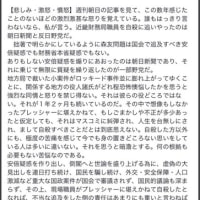
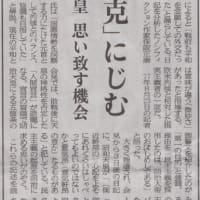
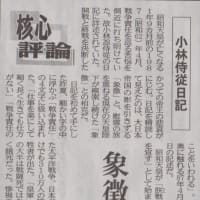
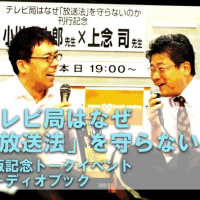
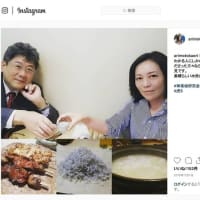
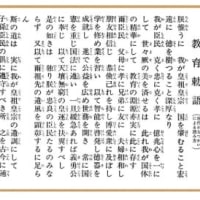

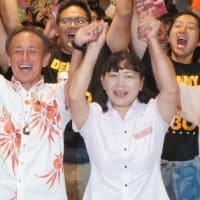
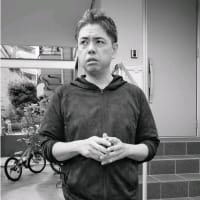
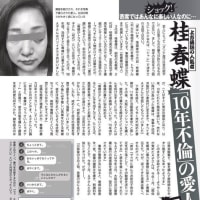
※コメント投稿者のブログIDはブログ作成者のみに通知されます